Monroe County councilors, commissioners try to regroup on question of next steps for new jail
Two weeks after the county council rejected funds for a new jail site, Monroe County officials met to discuss next steps. Councilors may draft a “risk tolerance” resolution as commissioners are pressing for answers on questions about the council’s position on location and one-story jail design.
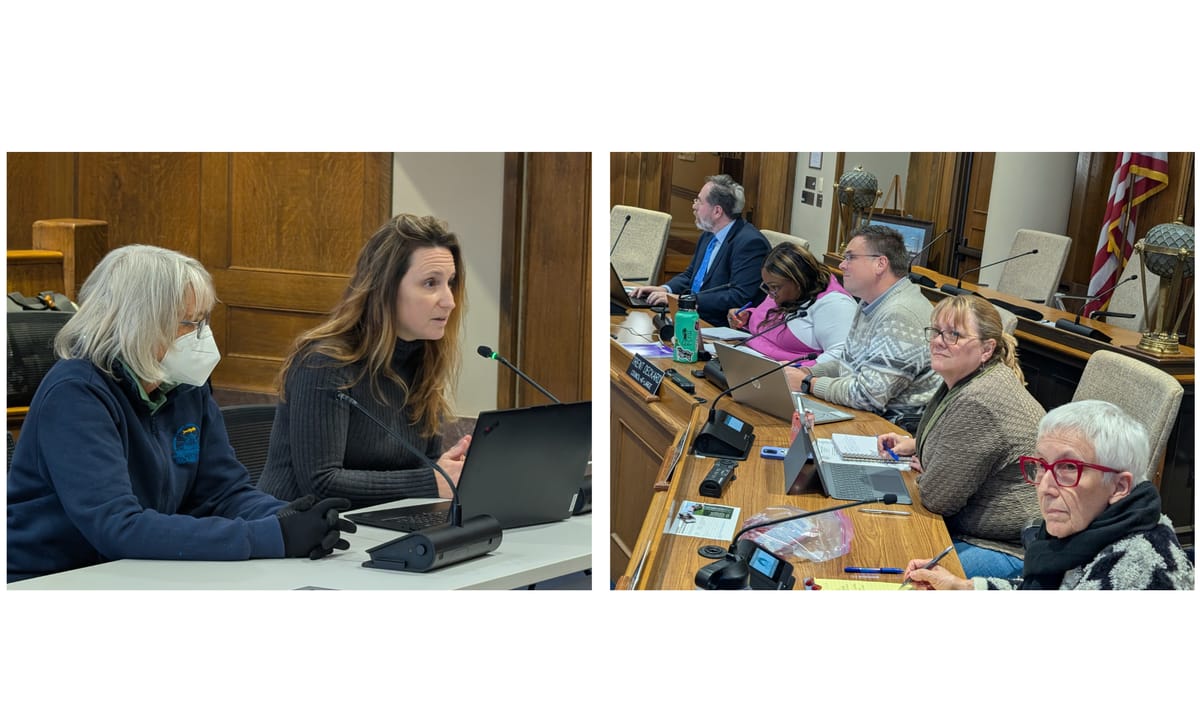
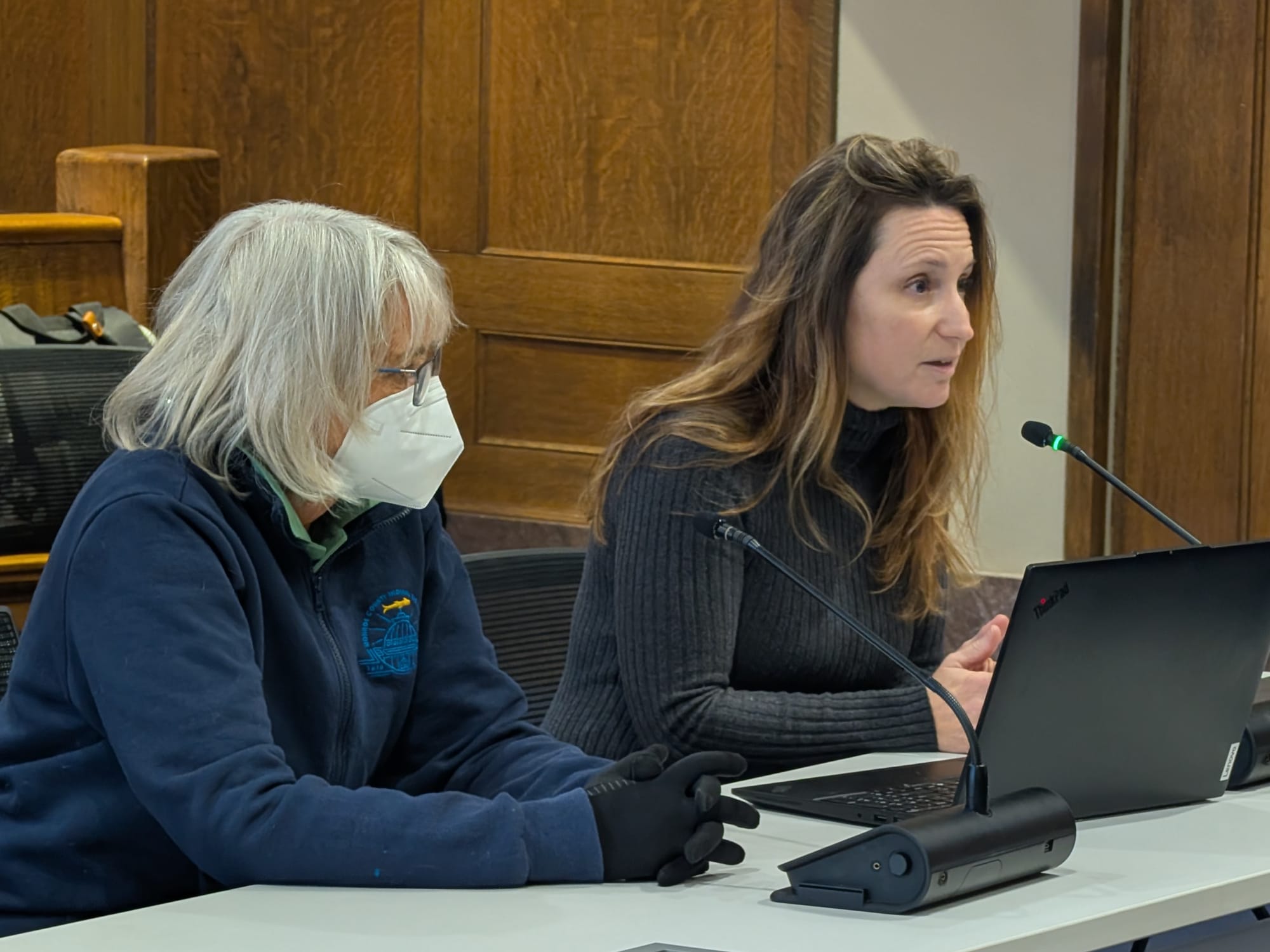
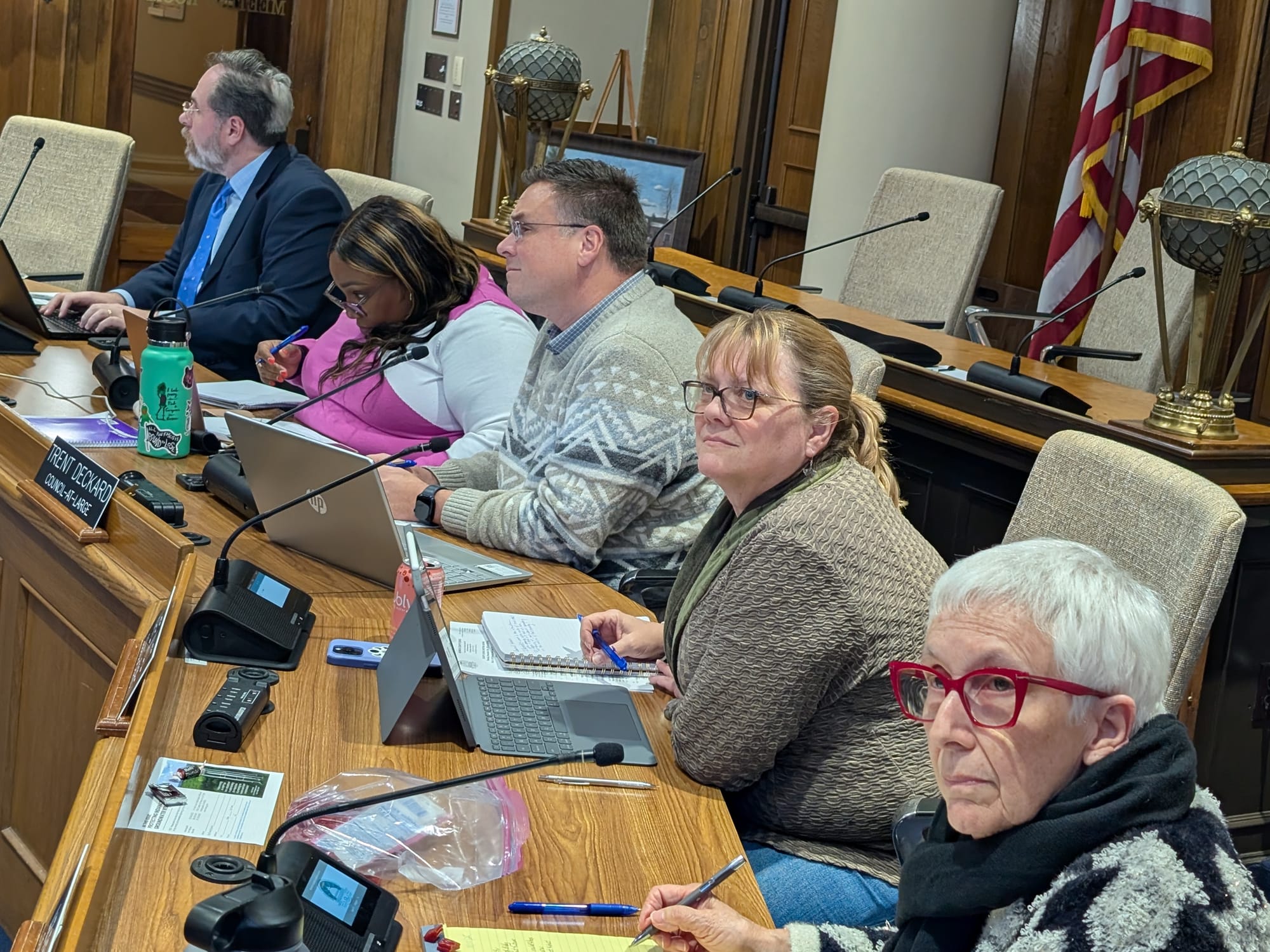
Left: County commissioners (from left) Julie Thomas and Jody Madeira. Right: Council councilors (from left): David Henry, Jennifer Crossley, Trent Deckard, Kate Wiltz, and Liz Feitl. Councilor Marty Hawk attended the meeting on a remote electronic connection. (Dave Askins, Nov. 10, 2025)
Two weeks ago, the Monroe County council unanimously defeated an appropriation that would have allowed for the closing on an $11.375-million real estate deal for North Park as the location of a new county jail and colocated justice center.
The working budget for the project has been $225 million. But the impact of SEA 1—the bill passed during the 2025 legislative session that revised property and local income tax structures—means that price tag is way out of reach, at least in the next three years.
The impetus for a new jail stems from a 2008 lawsuit, based on unconstitutionally overcrowded conditions, which led to the current settlement agreement under which the jail operates. That settlement agreement, which has been extended several times, expires in mid January.
On Monday (Nov. 10), county commissioners and county councilors were for the first time in a room together after the council’s vote, to talk publicly about the next steps towards building a new county jail.
There was no clear outcome to Monday’s conversation, which took place in two phases—one at the start of the county council’s regular meeting during departmental report time, and one at the end when there was a discussion item on the agenda about next steps for the jail. (The council’s regular Tuesday meeting was shifted to Monday because of Veterans Day.)
But there were some key takeaways from Monday’s meeting. One is that Ken Falk, the ACLU attorney who handled the 2008 litigation, will be touring the Monroe County jail facility on Nov. 25. That could give some insight into Falk’s current thinking about whether he is inclined to agree to another extension of the settlement agreement, which expires in mid-January.
Another takeaway is that the county council is likely to focus on drafting a resolution that lays out the council’s view of the price tag of a new facility that it now thinks that county government can afford, given the constraints of SEA 1. As councilor David Henry put it, the resolution would set out the council’s current “risk tolerance.”
But county commissioners want more than just a dollar figure. As commissioner Jody Madeira put it, the dollar amount alone doesn’t give insight into the council’s priorities and values. Both Madeira and commissioner Julie Thomas pointed out at Monday’s meeting that councilors gave a range of reasons for voting no two weeks ago, some of which involved more than just the ability of the county government to pay for the facility. Some councilors have qualms about locating a new jail facility outside of downtown Bloomington.
After Monday’s meeting, council president Jennifer Crossley said the resolution that the council could wind up drafting could incorporate in its “whereas” clauses the values and priorities that commissioners are looking for.
The approach that commissioners are taking to establishing some common ground on basic issues, like location, has been to identify key questions. At Monday’s meeting, Madeira and Thomas presented a list of five questions that they want the council to answer, with a deadline of Jan. 8. That’s the date of a county commissioners meeting, and comes before the settlement agreement expires.
Critical Questions for County Council
The path forward requires clear answers to fundamental questions about facility needs, community values, and practical implementation.
1. Constitutional Care & Safety Standards
Do you believe our current facility is meeting constitutional care requirements and providing the safest possible working environment for Monroe County jail personnel?
2. Community Values Alignment
Are the accommodations in the jail consistent with our community’s values regarding humane treatment and rehabilitation opportunities?
3. Renovation Feasibility
Given the completed studies by RJS and RQAW, do you agree that the current facility cannot be renovated to be made larger and/or meet constitutional requirements?
4. What is the County Council willing to support?
A new jail—one or multiple floors?
A new justice facility—co-located? Phased or non-phased? Or non-colocation?
5. Given your answers to these questions, please identify a property that meets these criteria.
The County Council must work collaboratively with the Sheriff, Board of Judges, Prosecutor, Public Defender, Clerk, and Probation to develop comprehensive answers to these questions. A formal response is requested by January 8th during a Board of Commissioners’ public meeting.
It was those questions that councilor David Henry meant, when he said, “Rather than maybe working through a question set, which is a reasonable idea, is maybe taking an approach where council passes a resolution about what its risk tolerance is for funding a future jail and or justice center.” Henry also said he thinks the budget is now driving the project.
Henry also expressed some skepticism about the idea that mid-January, the expiration date for the settlement agreement, should be considered a real deadline. Henry indicated that one approach could be to revisit the question of the settlement agreement, given that the county has been compliant with the agreement for so many years.
The settlement agreement sets forth inmate population maximums, at which point the sheriff has to notify the circuit court, and eventually other nearby jails to arrange for transfer of prisoners, if the population gets too high.
On Monday, Madeira reprised a point that she made on the night of the council’s vote, as well as at last week’s meeting of the county commissioners—that changes to the court rules in the state of Indiana and to the Indiana state constitution could push jail populations upward.
A proposed amendment to Criminal Rule 4(D) by the Indiana Supreme Court, would alter the rule governing the time period for trial and the conditions under which a defendant may be held in jail during a continuance. It would decrease the trial continuance period from 90 days to 70 days, but also allow the trial court to order a defendant to be held in jail during the continuance period when the defendant is charged with more serious offenses.. Madeira said even with the shorter “continuance clock” that could result in more jail bed days.
Another measure would amend the Indiana Constitution to allow bail to be denied when the accused “poses a substantial risk to the public.” That ballot proposal has passed the state legislature once, and will likely be passed again in the 2026 session, which will be enough to put it on the Nov. 3, 2026 ballot, when it is expected to pass. Madeira pointed to that constitutional amendment as putting upward pressure on jail populations.
Madeira also took on the idea that because the settlement agreement does not include a requirement that a new jail be constructed, it could not actually amount to a meaningful threat.
Madeira spoke about an “envelope” of documents beyond just the settlement agreement: “It is that envelope of documents that this understanding is built on—it is not just the settlement agreement.” In the envelope of documents are the studies that have been done including the one commissioned by county government and received in 2021, which concluded that “The jail facility is failing …” The report also says,“The jail facility is incapable of consistently ensuring and sustaining constitutional levels of inmate care and custody.”
Councilor Trent Deckard responded to a letter that the city council had sent to the council before the vote two weeks ago on the appropriation for the North Park purchase. The letter objects to moving the jail and justice center outside of the downtown area.
Deckard said on Monday that he’d like city officials to be specific about a different location: “ … If that is an honest city position, I’d like that to be a public thing—because one of the biggest issues we face in this community is NIMBYism. And I’m going to say that, and I’m going to own that. And when you have a jail, you have NIMBYism on steroids.” Deckard said, “I would be curious what areas [city officials] envision.”
Madeira led off the conversation at the start of the meeting by recounting the list of properties that had been considered over the last few years for a new jail. At one point in the conversation, Henry said, “Maybe need to set aside the … autopsy as to how we got to this point, but to accept that we’re at this point.”
The Thomson PUD, which was at one point the leading contender for a new jail location, appeared on Monday’s agenda as an item—the council was asked to approve terms and conditions for its sale. But the council voted at the start of Monday’s meeting to remove it from the agenda. That can be taken as an indication that the council now wants to keep the Thomson property as a potential option for a new jail site.
Commissioner Julie Thomas floated the idea of asking the county’s legal department to negotiate an extension on the purchase agreement for North Park, and wait to act on closing the deal until the state legislature’s intent on potential revisions to SEA 1 is known.
In her remarks, Madeira weighed in for the integration of the public into the next steps, “You know, if we can convene a public committee of leaders to weigh in on these matters, if we can do so in an expeditious fashion, I think it’s really important for the public to feel included and heard and to know that their views matter.”
At Monday’s meeting Crossley said that she thinks a special meeting is needed for the council to sort through the question of next steps and to work through a resolution setting forth its risk tolerance. The topic could not be reasonably considered at a regular council meeting, Crossley said.
After Monday’s meeting, Crossley said she’s now thinking that between Thanksgiving and Christmas would be a potential time to call a special meeting.


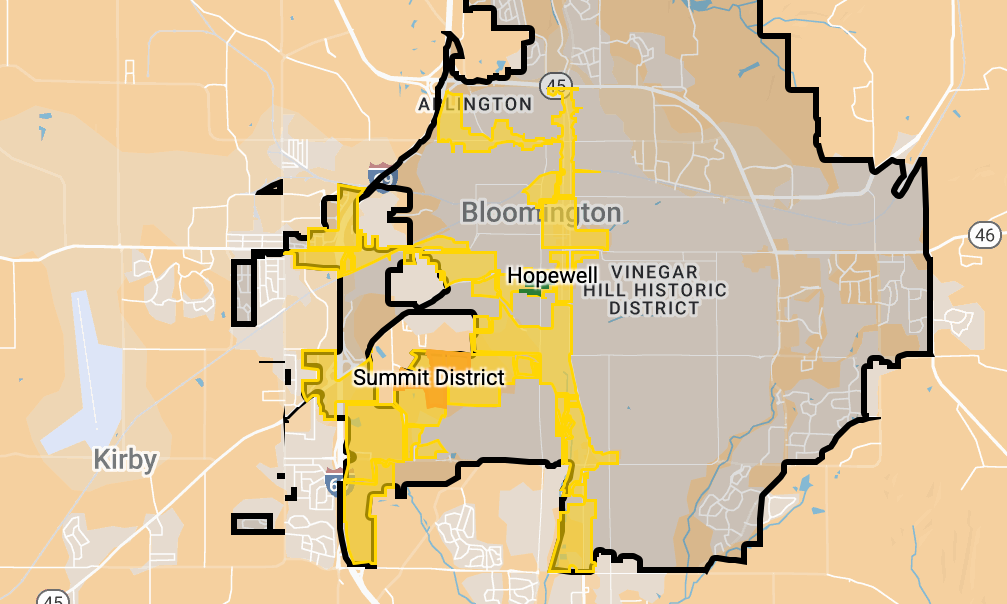
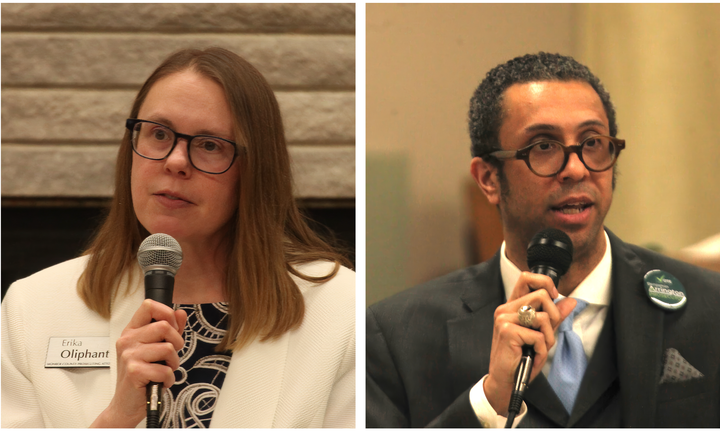
Comments ()